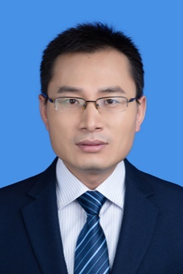 |
Vladimir Filaretov PhD & Professor Academicians of Russian Engineering Academy and Russian Science Academy Vice-president of Russian Engineering Academy, Vladivostok, Russia |
 |
Irwin King Ph.D & Professor IEEE Fellow, INNS Fellow, ACM Distinguished Member The Chinese University of Hong Kong, China |
 |
Dacheng Tao PhD & Professor Fellow of the Australian Academy of Science, IEEE Fellow, ACM Fellow Director of JD Explore Academy |
 |
Zhiwen Yu PhD & Professor Editor-in-Chief, CCF Transactions on Pervasive Computing and Interaction, CCF Young Scientist Award Northwestern Polytechnical University, China |
Methods of recognition and information processing for intelligent control of various robots
Vladimir Filaretov, PhD & Professor
Academicians of Russian Engineering Academy and Russian Science Academy
Vice-president of Russian Engineering Academy, Vladivostok, Russia
Head of Robotics Laboratory at Institute of Automation and Control Processes Far Eastern Branch of Russian Academy of Science
Head of the Department of robotics and Automation at Far Eastern Federal University
Member of Presidium of the Highest Engineering Council of Russia
Email:filaretov@inbox.ru

Bio-Sketch:Vladimir Filaretov was born in 1948. In 1973 graduated from Moscow State Technical University named after Bauman with honors with the specialty “Automatic systems”. In 1976 Mr. Filaretov was awarded the degree of candidate of sciences (engineering) and in 1990 he was awarded the degree of Doctor of Sciences in the field of automatic control. In 1992 Mr. Filaretov was confirmed in professor’s degree. In 1995 he was elected the member of an Russian and in 1996 the member of an International Engineering Academy. At present he is head of Department of Robotics and Automation at Far Eastern Federal University and Head of Robotic Laboratory of the Institute of Automatics and Control Process of Russian Academy of Sciences, President of Far Eastern Branch Russian Engineering Academy and Vice-president of Russian Engineering Academy. Professor Vladimir Filaretov is a specialist in the field of adaptive and optimal control devices of complicated nonlinear systems of automatic control with unknown and variable parameters, and also in the field of mathematical description of complicated multi-connected mechanisms dynamics. His researches are mainly directed at creation both industrial and underwater robots and manipulators and also other dynamic systems, allowing to automate technical devices and technological processes. Professor V. Filaretov has more than 640 scientific publications, 10 monographs and 330 patents (inventions) for developed technical systems and devices.
Graph Neural Networks from Theory to Applications
Irwin King, PhD & Professor
IEEE Fellow, INNS Fellow, ACM Distinguished Member
Department of Computer Science & Engineering
The Chinese University of Hong Kong, China
Email:king@cse.cuhk.edu.hk

Bio-Sketch:Prof. Irwin King is the Chair and Professor of Computer Science & Engineering at The Chinese University of Hong Kong. His research interests include machine learning, social computing, AI, and data mining. He has over 350 technical publications in journals and conferences in these research areas with high citations. He is an IEEE Fellow, INNS Fellow, and an ACM Distinguished Member. He is an Associate Editor of the Journal of Neural Networks (NN) and has served as the President of the International Neural Network Society (INNS), General Co-chair of WebConf 2020, ICONIP 2020, WSDM 2011, RecSys 2013, ACML 2015, and in various capacities in top conferences and societies such as WWW, NIPS, ICML, IJCAI, AAAI, APNNS, etc. He is the recipient of several Test of Time Awards including ACM CIKM2019, ACM SIGIR 2020, and ACM WSDM 2022 for his contributions made in social computing with machine learning. He also won the 2021 INNS Dennis Gabor Award for his outstanding contributions to engineering applications of neural networks. In early 2010 while on leave with AT&T Labs Research, San Francisco, he taught classes as a Visiting Professor at UC Berkeley. He received his B.Sc. degree in Engineering and Applied Science from the California Institute of Technology (Caltech), Pasadena, and his M.Sc. and Ph.D. degree in Computer Science from the University of Southern California (USC), Los Angeles.
More Is Different: ViTAE elevates the art of computer vision
Dacheng Tao, PhD & Professor
Fellow of the Australian Academy of Science, IEEE Fellow, ACM Fellow
Director of JD Explore Academy
Email:dacheng.tao@gmail.com

Bio-Sketch:Dacheng Tao is the Inaugural Director of the JD Explore Academy and a Senior Vice President of JD.com. He is also an advisor and chief scientist of the digital science institute in the University of Sydney. He mainly applies statistics and mathematics to artificial intelligence and data science, and his research is detailed in one monograph and over 200 publications in prestigious journals and proceedings at leading conferences. He received the 2015 Australian Scopus-Eureka Prize, the 2018 IEEE ICDM Research Contributions Award, and the 2021 IEEE Computer Society McCluskey Technical Achievement Award. He is a fellow of the Australian Academy of Science, the World Academy of Sciences, the Royal Society of NSW, AAAS, ACM, IAPR and IEEE.
Crowd Sensing 2.0: From Human-Centered to Heterogeneous Crowd Sensing
Zhiwen Yu, PhD & Professor
Editor-in-Chief, CCF Transactions on Pervasive Computing and Interaction
CCF Young Scientist Award, CCF Excellent Doctoral Dissertation Award
School of Computer Sciences at Northwestern Polytechnical University, China
Email:zhiwenyu@nwpu.edu.cn

Bio-Sketch:Dr. Zhiwen Yu is currently a professor and dean of School of Computer Science, Northwestern Polytechnical University, China. He has worked as an Alexander Von Humboldt Fellow at Mannheim University, Germany from Nov. 2009 to Oct. 2010, a research fellow at Kyoto University, Japan from Feb. 2007 to Jan. 2009, and a post-doctoral researcher at Nagoya University, Japan in 2006-2007. His research interests cover pervasive computing, Internet of Things, and mobile social networks. He is the Editor-in-Chief of CCF Transactions on Pervasive Computing and Interaction. He has served as an associate/guest editor for a number of international journals, such as IEEE Transactions on Human-Machine Systems, IEEE Communications Magazine, and ACM Transactions on Intelligent Systems and Technology. He received the CCF Young Scientist Award in 2011, the Humboldt Fellowship in 2008, and the CCF Excellent Doctoral Dissertation Award in 2006. He got the National Science Fund for Distinguished Young Scholars in 2017.